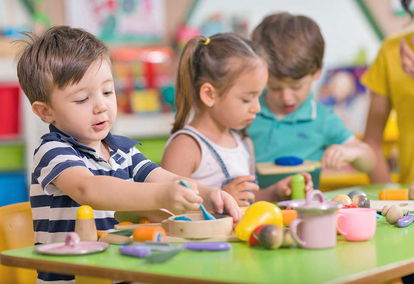Helping Preschoolers Make Friends

As preschoolers become more aware of others around them, they start to notice little ones close to their size and age and begin to consider the idea of friendship. Through play and social interactions, preschoolers realize playing with others is fun. And so they begin the lifelong journey of learning skills to make friends.
But as we know, it’s not always easy to know how to make friends. Many preschool leaders hear, “She (or he) said they are not my friend!” As leaders, it may seem easy to tell preschoolers that we are all friends or ask them to go and play nicely, but we need to remember that preschoolers need help learning friendship skills. Preschool is the perfect time to teach and practice the skills necessary to make and keep friends.
In the Mission Friends classroom, we can help preschoolers by providing the environment and opportunities to learn how to be a friend.
- Preschoolers can be taught ways to join others in play, such as learning to ask questions like “May I play with you?” or “What can I play with?” Leaders can model ways preschoolers can enter established play by suggesting a way to join in, such as “We could build a garage with these blocks for the cars” or “I will rock the baby doll while you make dinner.”
- We can help preschoolers look around and find someone else to invite to play. As we verbalize the process, preschoolers will hear words they can say to engage with other preschoolers. “Sammy, do you want to play with us?” or “Tom, can you help me with this puzzle?”
- Leaders can help preschoolers ask others to take a role in their play. For example, a preschooler could say, “Would you like to make the coffee in our cafe?” or “Can you help us build a tall skyscraper?” When we join the play alongside preschoolers, we can actively model and help preschoolers practice friend-making skills.
- We often tell preschoolers to share with others, but leaders need to give specific examples to help preschoolers understand. We can teach the techniques of taking turns with a toy, playing with a toy together, and trading toys so each one gets to play with the desired toy. Offering options will allow preschoolers to choose the best option for them.
- Helping preschoolers work through disagreements can be challenging for leaders. Invite preschoolers who are disagreeing to each take a turn to tell what the problem is and how it makes them feel. Talk with them about those feelings and what they can do to solve the problem. Give preschoolers several choices to help solve the disagreement or guide them as they come up with a solution. Providing choices can help preschoolers settle disagreements.
- One way to teach friendship skills is to read stories about the subject. In Be Kind, Make Friends, preschoolers can learn practical ways to be a friend. For example, share the book and ask, “How can we be kind?” Allow preschoolers to answer. “I can share a toy,” “I can help pick up toys,” or “I can play with someone new in class.” Help preschoolers discuss how being kind can lead to making friends.
- Another way to teach friendship skills is to ask preschoolers what they would do in a certain situation. You can then help preschoolers role play ways to practice friendship skills in the situation. Role-playing allows preschoolers to practice new and familiar skills of how to make friends and how to interact with friends.
- Reinforce why it’s important for us to make friends with others. Use the CSB Read to Me Bible to share Bible thoughts related to friends: Jesus said, “You are my friends” (see John 15:14); A friend loves at all times (see Prov. 17:17); and Be kind to each other (see Eph. 4:32).
Helping preschoolers learn the lifelong skills of making and keeping friends will help them to live on mission for Christ. Learning to care for others teaches preschoolers that everyone is special to God and that is why missionaries go to tell the good news of Jesus.
by Juliana Rhea